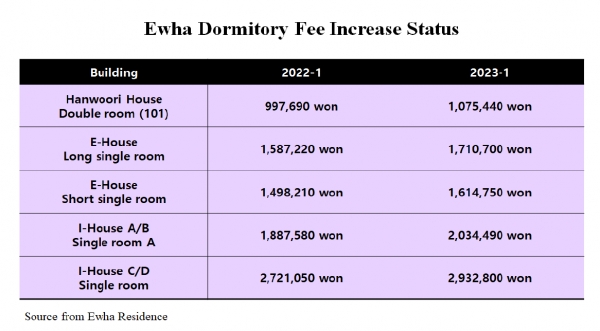
An Ewha student who wished to stay anonymous sought to rent a studio apartment near campus, yet the exorbitant cost forced her to live in a relatively inexpensive shared flat with strangers.
With a deposit of 5 million won, she had no choice but to live in a shared apartment because the only resort left for her other than that was a basement unit that looked like it was about to collapse.
“But even that was not cheap, so I had to take out a loan and also recently started a part-time job to pay the monthly rent,” she lamented. “It is so hard to go to school.”
In fact, a deposit of 5 million won is far from sufficient to find housing near Ewha Womans University. Many of the rental units available for 5 million won are usually basement units, and the monthly rent with a small deposit is necessarily high. With classes having shifted to face-to-face format starting last year, the demand for houses near the school has increased significantly as well as monthly rental costs.
Ewha dormitories are no exception to the high housing costs incurred by students, with dormitory fees increasing over the past few years.
A double room in Hanwoori House, which was around 1 million won in the first semester of 2022, has increased to around 1.1 million won this year. In addition, the price of a long single room in E-House has risen from 1.6 million won to 1.7 million won. Single rooms in I-House A also rose from 1.9 million won to 2 million won, with C increasing from 2.7 million won to 2.9 million won.
If one decides to live in I-House C, the dormitory fee is close to the monthly rental price of apartments located near the back gate of the school.
The dormitory official explained that the decision to raise the fees was inevitable. As the cost is set based on the overall cost of operating the dorm, it had to reflect the increase in cost used in remodeling, building deterioration and utility bills.
These problems were already being experienced by many students considering living near school or in the dorms.
In a survey of 74 Ewha students conducted by Ewha Voice from Feb. 24 to March 6, 93.2 percent of the respondents replied that they felt the recent increase in dormitory fees and monthly rent.
According to the survey, 36 students faced difficulty affording their housing costs. Some said they had to start part- time jobs in order to make ends meet, and others expressed how grateful yet sorry they felt for their parents paying their living costs.
With housing costs coming as a burden, many Ewha students sought different options to minimize the cost. The survey showed that 43.1 percent of the respondents chose shared accommodations or boarding houses as their best alternatives. The second most considered option at 36.9 percent was commuting, instead of living near school or on campus.
Regarding the recent increase in school dormitory fees, many students concurred that the dormitory price jump seemed excessive, compared to the benefits and facilities provided by the dorms. Although some acknowledged that it was inevitable due to the recent increase in heating bills, they stillemphasized that it is too high for students to afford.
Meanwhile, the real estate brokerage platform Dabang indicated that monthly rent costs for studio apartments near Ewha rose by 38 percent compared to last year. This is a significant change when compared to a 12 percent increase near Seoul National University, 8 percent near Kyung Hee University, and 3 percent near Hankuk University of Foreign Studies.
66 out of 74 respondents in the survey agreed that housing costs near Ewha are much higher than those in other areas. They criticized thecomparatively high cost of living that forces many students to move to areas far from school.
Professor Kwon Dae-jung from the Graduate School of Real Estate at Myongji University explained that the recent surge in rental costs is because the demand for houses or dormitories around Ewha is so high, while the supply is limited.
Kwon also stated that the recent increase in monthly rental costs in university districts is due to the impact of inflation that has been ongoing for three years. He emphasized that the government and private construction corporations have to come up with more practical solutions to provide students with monthly rental options at an affordable price.
In fact, there are a number of youth housing support projects in Korea, such as monthly rent loans with low interest for housing stabilization, Happy Dormitories, and Seoul Metropolitan Government’s homeless youth rent support project for college students who are having difficulty finding houses to live in. Although systems like these are in place, Kwon stated more diverse options should be introduced.
“Getting a loan means getting money that must be paid back later, so it is eventually the same in the end as it comes as a burden to students,” he said. “We need to think of different methods to provide financial support rather than lending money to students.”
Kwon also pointed out that the government’s new home policy and housing voucher systems must increase the supply and change locations to areasnear universities for students. What’s more, despite these systems having been implemented, many students are not even aware of their existence.

